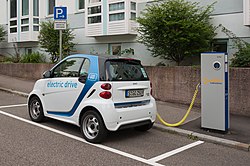Montevideo
As of 2021 there were 32 BEV buses in operation of a total of 5,391 buses nationwide (including urban, suburban and regional buses). [14] The main urban bus transport company in Montevideo (CUTCSA, with 1148 buses) adhered to COP26 emission targets, pledging to achieve a 25% of BEV fleet by 2025 (around 280 buses), reaching 100% by 2040. [15] On 28 February 2024 the company announced that during 2024 CUTCSA will replace 90 diesel buses for electric ones, also installing a bus charging station next to one of their depots, partially open to other bus companies, [16] and on 29 February 2024 it was announced that those buses will be Higer Azure A12BR, the same model as the prototype purchased by CUTCSA in 2023. [17] The first batch of 50 Higer buses (including 6 double-decker for tourist services), shipped in August 2024, arrived in Montevideo on 16 October 2024 [18] and started operations in November 2024. The second batch of Higer buses (all suburban units) was shipped in December 2024, arriving in Montevideo on 25 February 2025 [19] and starting operations on 24 March 2025. [20]
On 11 April 2024 CUTCSA announced the signature of the contract for the delivery of 100 BYD K9UD electric buses, order starting in 2024 to be completed by June 2025; the company also announced that on 9 April 2024 it signed the purchase of 100 200kWh chargers from the Chinese manufacturer Ekingpow, to be distributed among their depots. [21] On 19 September 2024 BYD delivered those 100 K9UD buses on their factory in Qingdao, China with the presence of CUTCSA authorities, [22] the first 50 arriving on 3 December 2024 and starting operations in January 2025. [23] The second batch of 50 BYD K9UD buses were shipped from Shanghai on 20 July 2025 on Grimaldi's Ro-Ro vessel Great Casablanca, [24] arriving in Montevideo on 1 October 2025, for a total of 221 electric buses for the company (about 19% of the fleet). [25] Furthermore, on 18 September 2024 the company announced the plan to purchase in 2025 the remaining 59 electric buses required to achieve their target of 25% fleet electrification, pending the completion of some infrastructure on their depots. [26] On 8 September 2025 it was announced that the CAF – Development Bank of Latin America had provided a loan to CUTCSA of 20 Million USD, in order to purchase the remaining 60 electric buses to achieve the company's electrification target. [27]
During 2023 the remaining bus companies in Montevideo, COME and transport cooperatives COETC and UCOT selected Yutong as supplier for another batch of locally adapted electric buses (divided windows, different couches, among others), being 9 for COETC, 7 for UCOT and 5 for COME; the first one (a prototype, destined for COETC) arrived in February 2024, while another 19 arrived at late April (a final one, for UCOT, arrived in October 2024). [28] [29]
The local government of Montevideo issued in February 2024 a US$37.3 million bond for the replacement of an additional 90 diesel buses for electric ones (to be distributed 60 for CUTCSA and the remaining 30 among the bus cooperatives), funds to be managed by the local Transport Authority. [30] Also, the national government program "Subite Buses" is funding the investment of several Departments' local governments to purchase 10 additional electric buses in 2023. [31]
Interior of the country
The local government of Salto expects to receive their subsidized bus in November 2023, expecting to buy an extra 5 units in the short term, [32] achieving an electrification rate of around 13% of the local buses.
On 28 November 2023, the Subite Buses program delivered the first electric buses to de departments of Maldonado, Flores, Tacuarembo and Salto, expecting to deliver buses to the departments of San Jose, Artigas and Río Negro by February 2024. [33]
In Durazno, the local company Nossar purchased two Ankai electric buses for their urban service, which started operations in July 2023. [34] [35] Meanwhile, on 6 February 2024 the Department of Canelones announced the purchase of 8 electric buses (from Yutong, Ankai and Guangdong) for their urban and suburban lines, to be distributed among 5 mass transit companies; [36] those buses were presented on 10 May 2025, also mentioning that an additional bus was being acquired through the "Subite Buses" program. [37]
On 12 October 2025 the company CODESA, which operates urban and suburban transport services in the Department of Maldonado, announced the purchase of 4 Akai electric buses. [38] The national government informed on 20 June 2024 that it was revamping the so called "gasoil trust fund", that helped subsidize the cost of diesel fuel for buses, as well as replacements of units; the new trust fund will stop funding new diesel buses, accepting only new electric buses to receive the subsidy (all previously funded buses will continue to receive funding). [39]



